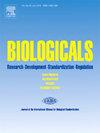CDC20 is a potential target gene to inhibit the tumorigenesis of MDCK cells
Abstract
MDCK is currently the main cell line used for influenza vaccine production in culture. Previous studies have reported that MDCK cells possess tumorigenic ability in nude mice. Although complete cell lysis can be ensured during vaccine production, host cell DNA released after cell lysis may still pose a risk for tumorigenesis. Greater caution is needed in the production of human vaccines; therefore, the use of gene editing to establish cells incapable of forming tumors may significantly improve the safety of influenza vaccines. Knowledge regarding the genes and molecular mechanisms that affect the tumorigenic ability of MDCK cells is crucial; however, our understanding remains superficial. Through monoclonal cell screening, we previously obtained a cell line, CL23, that possesses significantly reduced cell proliferation, migration, and invasion abilities, and tumor-bearing experiments in nude mice showed the absence of tumorigenic cells. With a view to exploring tumorigenesis-related genes in MDCK cells, DIA proteomics was used to compare the differences in protein expression between wild-type (M60) and non-tumorigenic (CL23) cells. Differentially expressed proteins were verified at the mRNA level by RT-qPCR, and a number of genes involved in cell tumorigenesis were preliminarily screened. Immunoblotting further confirmed that related protein expression was significantly reduced in non-tumorigenic cells. Inhibition of CDC20 expression by RNAi significantly reduced the proliferation and migration of MDCK cells and increased the proliferation of the influenza virus; therefore, CDC20 was preliminarily determined to be an effective target gene for the inhibition of cell tumorigenicity. These results contribute to a more comprehensive understanding of the mechanism underlying cell tumorigenesis and provide a basis for the establishment of target gene screening in genetically engineered non-tumorigenic MDCK cell lines.

 求助内容:
求助内容: 应助结果提醒方式:
应助结果提醒方式:


